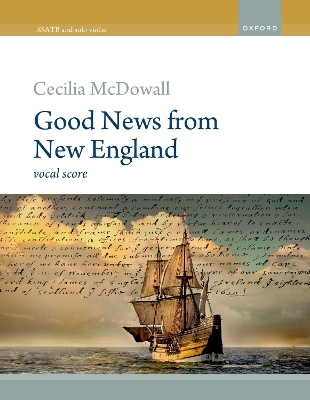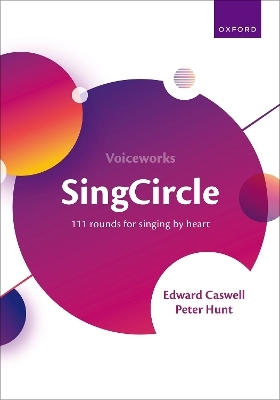
Good News from New England
Seiten
2023
|
Vocal score
Oxford University Press
978-0-19-354055-2 (ISBN)
Oxford University Press
978-0-19-354055-2 (ISBN)
for SSATB and solo violin
This exciting work for choir and solo violin draws its title from Edward Winslow's 1624 chronicles, Good Newes from New England, in which he describes the Mayflower Pilgrims' settlement in the New World. It closes with a version of 'The Old Hundredth', and the audience is encouraged to join in singing this hymn.
for SSATB and solo violin
This exciting work for choir and solo violin draws its title from Edward Winslow's 1624 chronicles, Good Newes from New England, in which he describes the Mayflower Pilgrims' settlement in the New World. The first movement sets William Bradford's account of the Pilgrims' arrival after their long, perilous journey. McDowall cleverly uses tonality to musically chart their voyage, with a gradually descending shift through keys. Bookended by folk-like violin passages, the second movement alludes to the Bay Psalm Book with its plain homophonic style, and McDowall introduces occasional dissonance to intensify the text's anguish. As its title, 'Thanksgiving', suggests, the final movement brings a sense of joyful release, with the violin in playful dialogue with the dance-like vocal lines. It closes with Henry Ainsworth's version of 'The Old Hundredth', which was sung on the Mayflower, and the audience is encouraged to join the choir in singing this hymn.
This exciting work for choir and solo violin draws its title from Edward Winslow's 1624 chronicles, Good Newes from New England, in which he describes the Mayflower Pilgrims' settlement in the New World. It closes with a version of 'The Old Hundredth', and the audience is encouraged to join in singing this hymn.
for SSATB and solo violin
This exciting work for choir and solo violin draws its title from Edward Winslow's 1624 chronicles, Good Newes from New England, in which he describes the Mayflower Pilgrims' settlement in the New World. The first movement sets William Bradford's account of the Pilgrims' arrival after their long, perilous journey. McDowall cleverly uses tonality to musically chart their voyage, with a gradually descending shift through keys. Bookended by folk-like violin passages, the second movement alludes to the Bay Psalm Book with its plain homophonic style, and McDowall introduces occasional dissonance to intensify the text's anguish. As its title, 'Thanksgiving', suggests, the final movement brings a sense of joyful release, with the violin in playful dialogue with the dance-like vocal lines. It closes with Henry Ainsworth's version of 'The Old Hundredth', which was sung on the Mayflower, and the audience is encouraged to join the choir in singing this hymn.
Cecilia McDowall has been described by the International Record Review as having a 'communicative gift that is very rare in modern music. An award-winning composer, McDowall is often inspired by extra-musical influences, and her choral writing combines rhythmic vitality with expressive lyricism. Her music has been commissioned, performed, and recorded by leading choirs, among them the BBC Singers, The Sixteen, and Oxford and Cambridge choirs and is regularly programmed at prestigious festivals in Britain and abroad. In 2017 McDowall was selected for an Honorary Fellow award by the Royal School of Church Music.
| Erscheint lt. Verlag | 17.8.2023 |
|---|---|
| Reihe/Serie | New Horizons |
| Verlagsort | Oxford |
| Sprache | englisch |
| Maße | 210 x 295 mm |
| Gewicht | 170 g |
| Themenwelt | Kunst / Musik / Theater ► Musik ► Klassik / Oper / Musical |
| ISBN-10 | 0-19-354055-X / 019354055X |
| ISBN-13 | 978-0-19-354055-2 / 9780193540552 |
| Zustand | Neuware |
| Informationen gemäß Produktsicherheitsverordnung (GPSR) | |
| Haben Sie eine Frage zum Produkt? |
Mehr entdecken
aus dem Bereich
aus dem Bereich
Notenblätter (2023)
Oxford University Press
CHF 54,65


